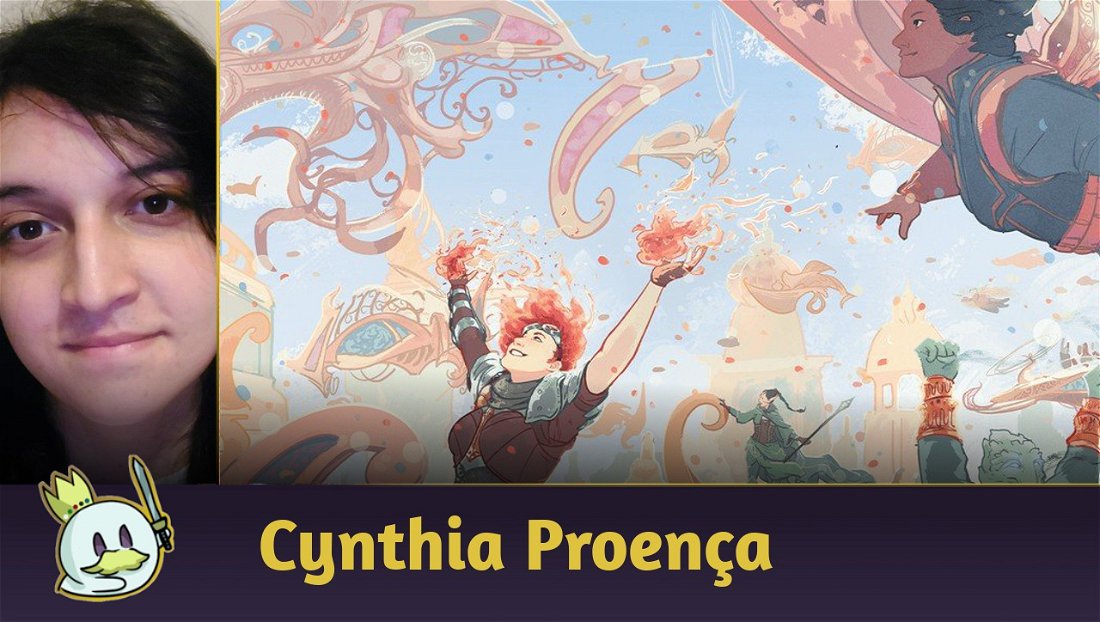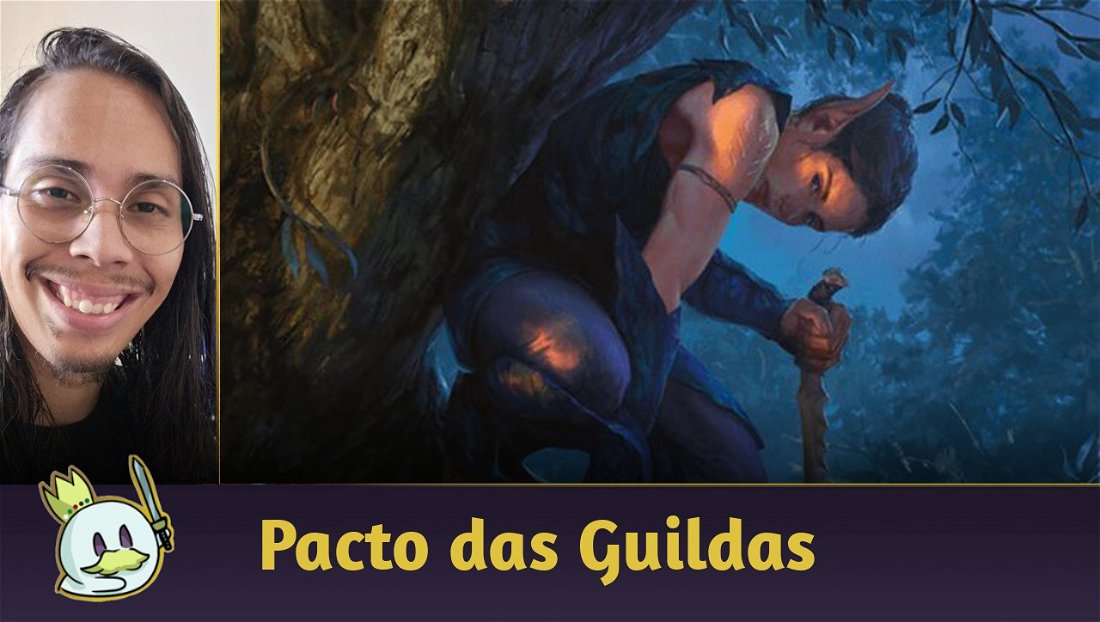Out of everything Magic: The Gathering can offer in blue and black, my favorite strategy has always been using my opponent's deck against them. On one side, this approach has an obvious weakness: it is as good as your opponent's decks, and, sometimes, a standalone enemy card isn't that great for what is happening on your board.
On the other side, it is precisely the fact you'll use random, unsorted enemy resources that makes this type of deck a true Chaos deck. It is difficult to tell what will even happen on your board as you play it.
Ad
Usually, I consider Xanathar, Guild Kingpin the most fun card for this type of deck. However, thanks to Murders at Karlov Manor, we now have a new card to play as chaotically as we want; a commander who uses this type of strategy incredibly well.
We'll explore this commander in today's article.
The Commander

Etrata, Deadly Fugitive is the star of today's deck. This version of Etrata is deeply different from her previous version, Etrata, the Silencer. The Silencer focused on attacking your opponents again and again and eventually tried to win the match with a single blow.
As for Etrata, Deadly Fugitive, her goal is entirely different. Her strategy is more like an Assassin typal that wants to connect damage through attacks to trigger Cloak on the top of our opponent's decks directly onto our board. This is how you'll steal their cards.
Cloak is relatively similar to Tarkir's Manifest; it brings cards from somewhere to your board, but they'll be face-down 2/2 creatures with Ward 2. Usually, you can only turn face-up cards that were originally creatures, be it by paying their mana cost or the cost of the Disguise ability described in the card's text.
However, some cards have abilities that let you turn a creature that entered play through Cloak face-up, as long as the card in question was originally a permanent. So, sorceries or instant spells won't benefit from this type of strategy. All of this is no issue for Etrata, Deadly Fugitive.
Our commander's main ability grants the following text to face-down cards: "Turn this creature face up. If you can't, exile it, then you may cast the exiled card without paying its mana cost". You just need to pay the standard cost of one blue mana, one black mana, and two mana of any color.
This is incredible progress for abilities that steal enemy cards, as they used to preserve the original cost of the cards they stole; the only thing they let you do was use mana of any color to cast them. With this commander, we can access remarkable cards like Blightsteel Colossus or Omniscience for a much lower cost.
This means, for a standard cost that you can actually pay multiple times per turn, you'll be able to turn face-up any permanent, or cast any instant or sorcery spell that is face-down.
And there's more: you don't need to activate this ability only at sorcery-speed, like many other cards forced you to. This will change the rhythm of the game entirely, and might even let us play sorceries at instant speed. Believe me, I read Etrata, Deadly Fugitive's rules on Gatherer again and again, and nothing will stop us from doing that.
This ability lets us actually wreak havoc on the board. Your opponents won't know what they should or shouldn't block, if they should attack, or even what kind of atrocities the cards on your board hide. And that's really fun on multiplayer tables.
The Deck
As we said before, a good portion of this deck is Assassin creatures, which are the best cards to play with Etrata, Deadly Fugitive and her strategy because of how helpful they are. They're the ones that will let your commander put face-down cards on your board.
Ad
Unfortunately, we still don't have the Assassin's Creed cards, which would be perfect for this list, but I added at least Ezio, Blade of Vengeance because he really matches this strategy. He'll draw cards any time your Assassins deal combat damage, which is a great synergy with our commander. It's a great idea to get this card as soon as you can.
That being said, this is the deck we'll discuss today:
Rulings

According to the rules, face-down cards are 2/2 creatures with no creature type. Well, if they were Assassins, we would be able to use them to create more creatures from the top of our opponents' decks with Etrata's ability. And, well, there's a way to do that.
According to the rule 613.1d, face-down creatures can gain creature subtypes through cards like Arcane Adaptation and Maskwood Nexus, and this will turn our face-down creatures into, yes, Assassins.
This will create a fascinating entropy in our deck. Cloaked creatures will be able to deal combat damage and create even more Cloaked creatures on your board, which will fill your board exponentially fast.
Our Assassins

You know, creature subtypes that represent the card's occupation, or their "job", are usually left behind compared to subtypes that actually represent that creature's biology. So, not many people consider building Artificer or Advisor decks, and instead Merfolk, Dragons, and Goblins are much more popular (well, Wizards and Warriors are an exception to this concept).
In today's article, we'll use various Assassin cards. These cards have been in Magic: The Gathering since the Alpha with Royal Assassin, and have stood strong until today, ironically, hiding in the shadowy corners of the game. It actually makes a lot of sense flavor-wise.

Among the ones we included in this list, Thorn of the Black Rose and Ravenloft Adventurer are incredible for this strategy because they interact with the Monarch and Take the Initiative. These mechanics give us many benefits when we deal combat damage with our creatures.

Mari, the Killing Quill also let us play impressive lines. Among them, I can list the fact that she makes the game a bit easier for Etrata's other version, which we also added to this deck. As both Etratas use the same counters, we can create a symbiotic link between them, and make one use the counters created by the other. This usually ends with Etrata, the Silencer removing players from your table.

We also added Shapeshifters, creatures that represent all creature subtypes at the same time, so we don't need to use a Maskwood Nexus.
Mothdust Changeling and Changeling Outcast are really small Shapeshifters with some evasion, so they'll deal combat damage more often. Universal Automaton is a great choice as well.
Ad
And, of course, we have Roaming Throne, the best card nowadays for any typal deck, considering it triggers abilities from creatures with your chosen subtype an extra time. This makes your Assassins even better.

Finally, we have Ramses, Assassin Lord, which is a Lord for your Assassins. He also buffs the power and toughness of the ones on your board, besides being, as well as Etrata, the Silencer, another win condition for you.
Support for Face-Down Cards

Besides our Assassins, we also want to buff our face-down cards. A card that represents what we want to do really well is Aphetto Runecaster, which draws a card whenever a creature is turned face-up.

Another way to turn cards face-up is through Blink effects, like Conjurer's Closet and Ghostly Flicker. You'll exile the card, then, in exile, it is once again what it was originally, and you'll return it to your board face-up, like usual.
Unfortunately, according to the rules, sorceries and instant spells can't enter play like this, so if you blink one of them that is face-down, that would only exile them indefinitely. It is a pity, but at least it doesn't make cards face-down even harder to understand and play.
However, Primordial Mist can exile face-down cards and lets you play them on that same turn, which means you'll be able to ramp, play sorceries and instants from exile.

Ixidor, Reality Sculptor is another way to turn your cards face-up, and costs even cheaper than your commander. If you combine this with Training Grounds, both Ixidor's and our commander's effect will be available for as cheap as they can get, which really improves your overall game plan.
Finally, a Combo

Brine Elemental and Vesuvan Shapeshifter is an interesting combo. Vesuvan Shapeshifter copies the Elemental's ability when you turn it face up, and this ability skips your opponents' untap step. You can also easily use these two cards again like this, considering Vesuvan Shapeshifter turns face-down again as soon as your turn starts, which will let you turn it face-up once again afterward…
This is the endless loop that resembles a sort of Stasis or Winter Orb, only better, as you won't be affected by this effect. Only your opponents will suffer.
Budget Etrata, Deadly Fugitive
As usual, we added a budget option if you want to play this deck without spending so much money. This is a decent base to start playing, and then later on you can upgrade it in any way you want.
The most expensive tech card I kept was Training Grounds because of how much quality of life it gives to our deck. However, much of this deck's biggest costs are its great mana base, so, if you replace it, its price may drop significantly.
Ad
This is our budget list:
Final Words
This is the deck I decided to build from this set. It had a fun, chaotic theme, which is something I haven't seen much of lately. Now, we just need to wait for the Assassin's Creed set to drop so we can upgrade this deck with even more new cards.
See you next time!










— Comentarios0
Se el primero en comentar